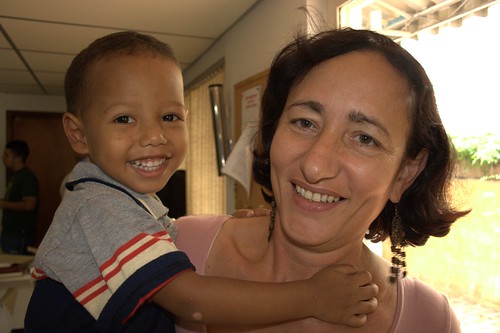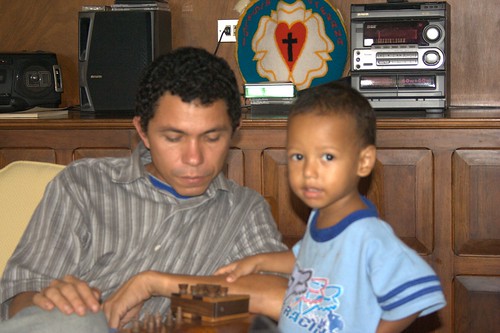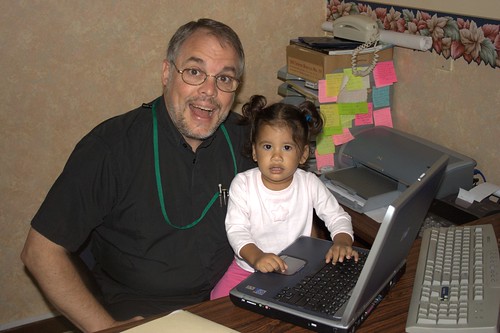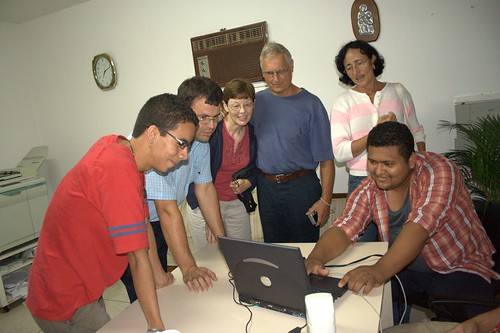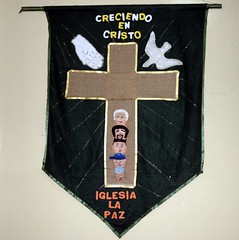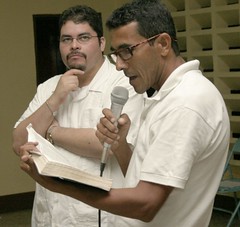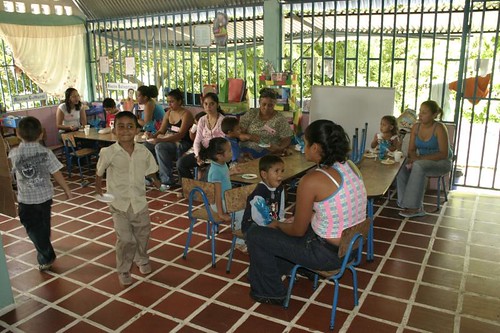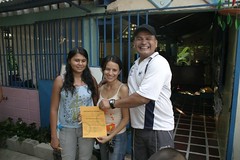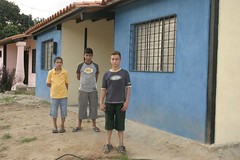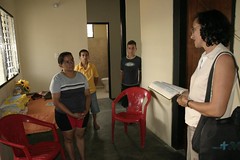
Twelve-year-old Sandro Pérez, who lives across the street from us, has been one of our more faithful and attentive students in both Sunday school and confirmation class. Always cheerful, mature for his age and showing signs of musical talent, Sandro is receiving financial assistance to stay in school from
Children's Christian Concern Society of Topeka, Kansas. Unfortunately, Sandro was hospitalized this week with dengue fever.
Dengue fever is spread by
Aedes aegypti, a species of mosquito that thrives in tropical regions. Over the last four years, local health agencies have made a dedicated effort to control the spread of dengue by spraying with pesticide the areas where
Aedes aegypti may breed. The mosquitos breed on water standing in artificial containers such as plastic cups, used tires, broken bottles, or flower pots, so there also has been an effort to educate everyone on the importance of sanitation as a means of preventing
Aedes aegypti from reproducing.
There is no vaccine or cure for dengue. Those stricken must wait for the disease to run its course.
Symptoms include:
- Severe muscle and joint pain (which is why dengue is also known as "bonebreak fever").
- Fever
- Chills
- Constant headaches
- Bleeding from nose, mouth or gums
- Severe dizziness
- Loss of appetite
The more advanced stage of the disease,
dengue hemorrhagic fever, may produce shock and hemorraging, leading to death. The fatality rate for all forms of
dengue is relatively low (5
percent), nevertheless it was a serious matter for someone as young as Sandro.
Luz Maria and I visited Sandro in the pediatric clinic, and the other youth in the confirmation class prayed for him and made cards from construction paper for us to present to Sandro on our next visit. We thank God that Sandro returned home the next day and we gave the cards to him there.
 New semester begins
New semester begins
Webegan a new semester of the preschool September 15 with 24 children enrolled. Every week begins with the singing of the national anthem and praying the Lord's Prayer. For seven weeks we will focus on the creation story in the first chapter of Genesis. Yepci had the children
draw with white crayons on black construction paper to symbolize the creation of light and the separation of night and day on the first day of creation.
Old dog, new tricks
In case you missed the entertainment industry headlines, Madonna, Michael Jackson and Sharon
Stone all have turned 50 this year. This month it will be my turn, along with country music stars,
Alan Jackson and
Tanya Tucker. While I have not attained the same level of
wealth and fame as some of my contemporaries, I have always been considered something of a legend in my own mind.
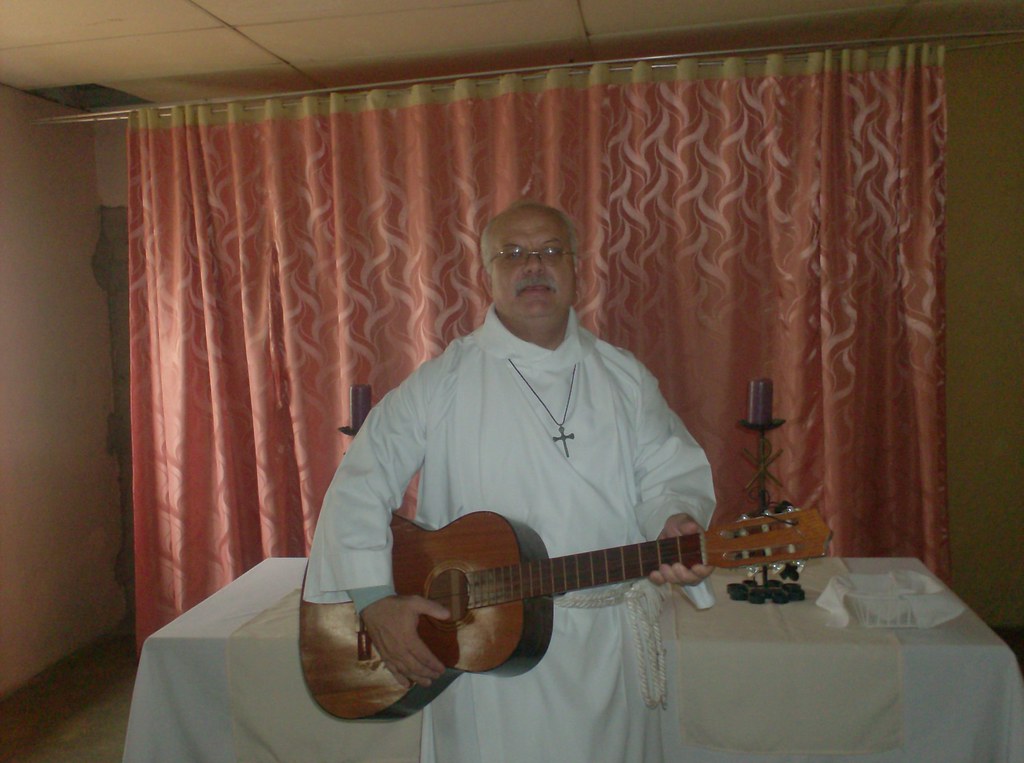
And I am taking guitar lessons for the first time since I was about 16 or 17. Eduardo is teaching a number of people how to play musical instruments, primarily the cuatro (Venezuelan four-stringed guitar). Luz María's daughter, Charli, is learning to play the cuatro. But while the cuatro is relatively easy to learn, while the six-stringed guitar is more complicated. I hope that by volunteering I will encourage more of the young people to learn the guitar. I also realize that since:
- Singing is usually a part not only of Sunday morning worship, but also of Bible studies and more informal gatherings here, and;
- I cannot always count on having someone else to provide musical accompaniment;
I should have some knowledge of the most commonly available and versatile instrument (Beethoven once called the guitar a symphony orchestra in one instrument).
Some of the larger congregations in the Lutheran Church of Venezuela add an electronic keyboard or piano, and drums to the guitar as part of an instrumental ensemble. Pipe organs
are quite rare. I have seen only one pipe organ since my arrival in Venezuela and it was not in our Lutheran Church of Venezuela congregations. What's more, it was the only pipe organ I've ever seen that might fit in someone's living room.
Kenny Rogers in the cybercafe
As I sat in the cybercafe, uploading photos, the owner, Alexis, played a CD of
Kenny Rogers' greatest hits that his brother had brought him from the United States. Since I was the only customer at the time, I suspect it was for my benefit. It brought back of lot of fond memories
of the days when Kenny regularly scored No. 1 hits on both the country and pop music charts. I always liked
"Reuben James", a song about a white orphan boy adopted by a black sharecropper:
"Reuben James, you still walk the furrowed fields of my mind,
A faded shirt, a weathered brow, callused hands upon the plow,
I loved you then and I love you now, Reuben James."
After awhile, Alexis came over to talk to me. I had told him something about our mission in La Caramuca. "Is your mission affiliated with the Baptist church?" he wanted to know.
"No," I said. "It's supported by the Lutheran Church of Venezuela."
"I have read about Martin Lutero," Alexis said. "Many of the things he did were very good." His concern seemed to focus on the indulgence trade. "I don't understand people taking money from other people like that in the name of God."
Then Alexis seemed to change the subject. "What can you tell me about the Mormons?" he asked.
"The Mormons do not believe in the doctrine of the Holy Trinity," I said. "Nor do they believe that Jesus Christ made full atonement for the sins of all people on the cross."
"I have talked to the young Mormon missionaries," Alexis said. "Their families give a lot of money to their church, but they receive only a small amount to live on. I don't understand this."
Then he revealed that he had talked to representatives of a number of the religious groups that are active in Venezuela. "It is so hard to know what is the truth," he said.
"All false religions have one thing in common," I said. "They teach that we must earn God's favor by our own works. But the Bible teaches that Christ paid the price for all our sins on the cross and that only through Him may we be reconciled with God."
"Many people here would rather pray to the santos, the saints, rather than God because they believe that if they have done wrong, God will not listen to their prayers," Alexis said.
Then some more customers came in, and he had to attend to them. The moment was gone. But before I left, I gave Alexis the address of Corpus Christi Lutheran Church and invited him to attend on Sunday and learn more about what we believed. God grant that I have another opportunity to talk with Alexis about these things.
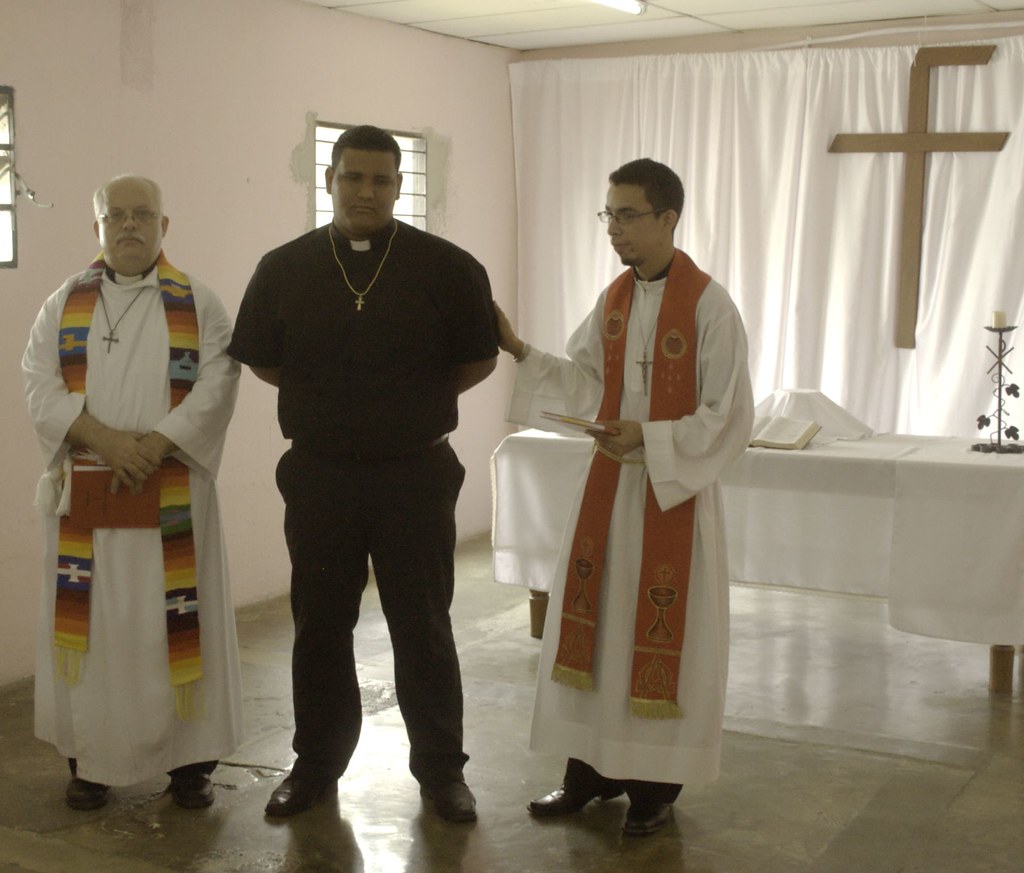
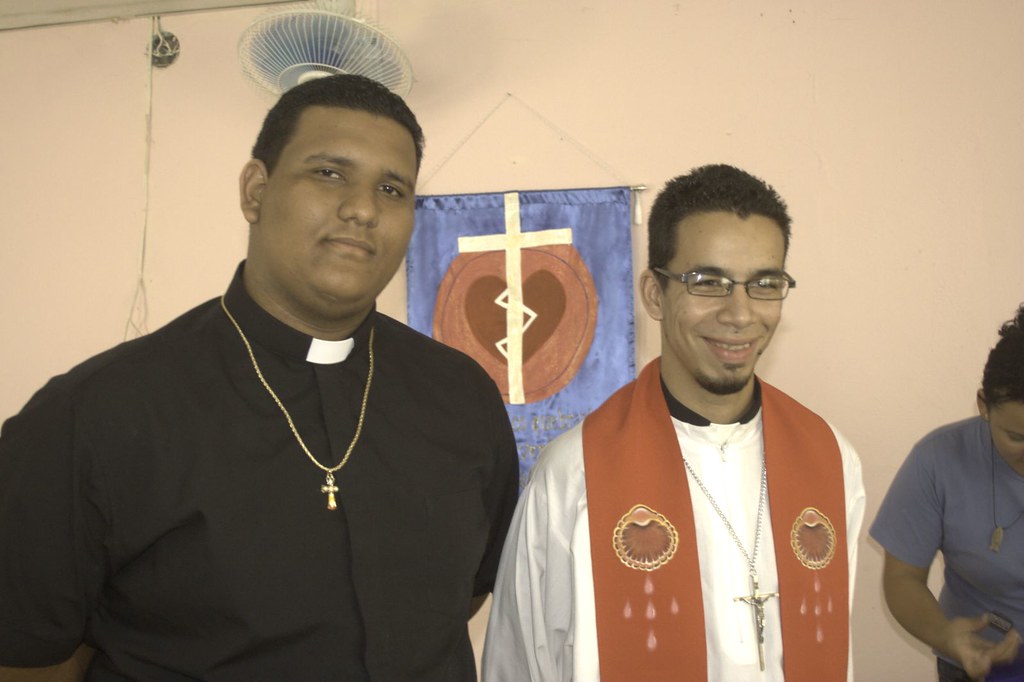


















 He continued studying theology through the Juan de Frias Institute and eventually served as pastor of Principe de Paz (Prince of Peace) Lutheran Church in the small village of Sierra Caroni.
He continued studying theology through the Juan de Frias Institute and eventually served as pastor of Principe de Paz (Prince of Peace) Lutheran Church in the small village of Sierra Caroni. "Behold, children are a heritage from the Lord,the fruit of the womb a reward."Psalm 127:3
"Behold, children are a heritage from the Lord,the fruit of the womb a reward."Psalm 127:3
 There is much room for discussion here, but I want to move on to my next point: Today conservative Protestants and Roman Catholics differ on the extent to which "family planning" methods should be used by married couples. There is no disagreement on abortion and the immorality of sexual relations outside of marriage.
There is much room for discussion here, but I want to move on to my next point: Today conservative Protestants and Roman Catholics differ on the extent to which "family planning" methods should be used by married couples. There is no disagreement on abortion and the immorality of sexual relations outside of marriage.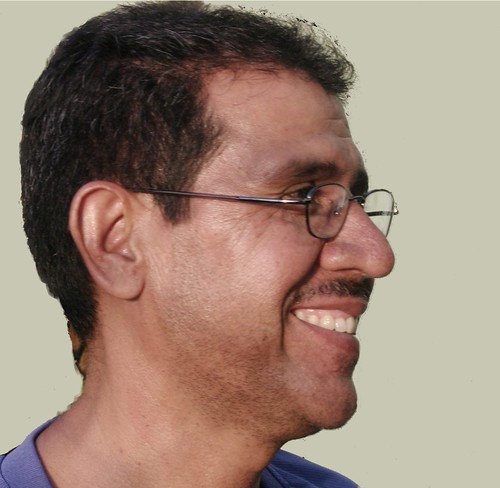




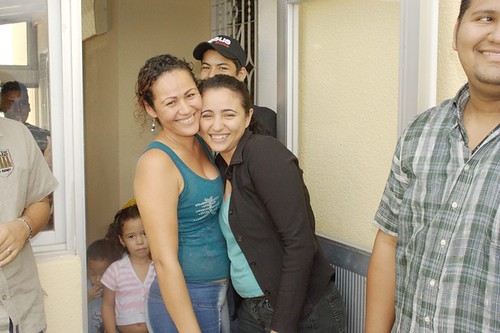 School is out now. The new school year begins in mid-September. Yepci and her children took advantage of the vacation period and spent three weeks in Caracas with Yepci's sister, Wuendy. It really was more of a working vacation as Yepci helped prepare food first for seminarians studying Greek and then for a team of volunteers from the United States who performed renovations in Quinta Lutero, the national church's office in Caracas.
School is out now. The new school year begins in mid-September. Yepci and her children took advantage of the vacation period and spent three weeks in Caracas with Yepci's sister, Wuendy. It really was more of a working vacation as Yepci helped prepare food first for seminarians studying Greek and then for a team of volunteers from the United States who performed renovations in Quinta Lutero, the national church's office in Caracas.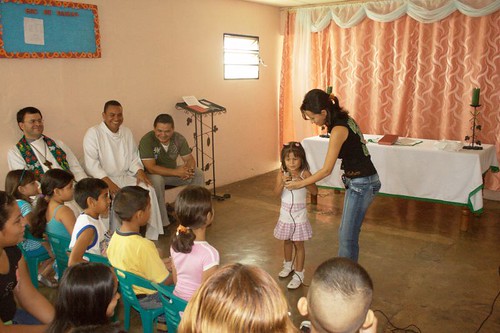 Yepci and her children, Aaron, Oriana and Elias, were back in time for vacation Bible school at Corpus Christi Lutheran Church in Barinas, August 22 to 25. The VBS was based on the story of Noah's Ark and how, as Noah and his family passed through the waters of the Great Flood, we pass through the waters of baptism to salvation. Attendance peaked at around 50 children. Many of them attended the Sunday service at Corpus Christi with their parents (a number of whom were not members) to explain what they had learned.
Yepci and her children, Aaron, Oriana and Elias, were back in time for vacation Bible school at Corpus Christi Lutheran Church in Barinas, August 22 to 25. The VBS was based on the story of Noah's Ark and how, as Noah and his family passed through the waters of the Great Flood, we pass through the waters of baptism to salvation. Attendance peaked at around 50 children. Many of them attended the Sunday service at Corpus Christi with their parents (a number of whom were not members) to explain what they had learned.